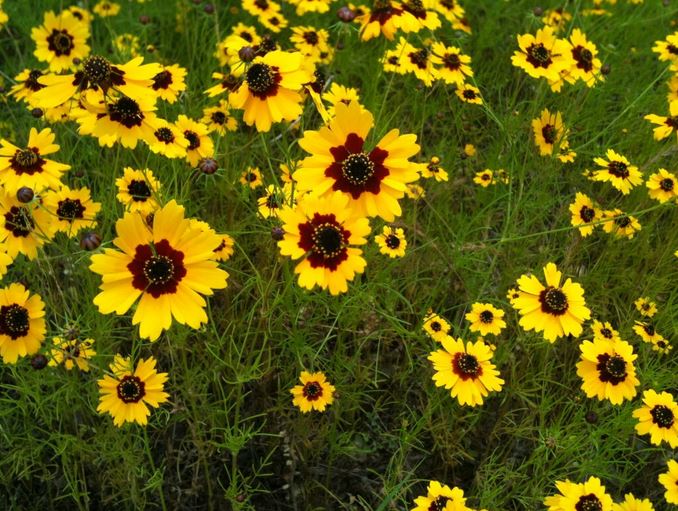 Wildflowers do gorgeous things to empty spaces and vases; and, if you want to give them a try, mid-September through mid-November is planting time in north central Texas.
Wildflowers do gorgeous things to empty spaces and vases; and, if you want to give them a try, mid-September through mid-November is planting time in north central Texas.
Contrary to popular rumor, the seeds require more than being tossed then forgotten until the spring. If you’re thinking of that barren spot of compacted clay dirt– where even weeds don’t grow– forget wildflowers.
And, yes, Virginia, they need water– if Mother Nature doesn’t provide it. Did I mention they like full-sun all day and decent soil drainage?
Clean and clear the chosen area, then dig up a spade full of earth. In southern Denton County, you’re likely to have either heavy clay or sandy soil. Compensate for either soil by mixing in lots of compost. Is it possible to add too much compost? The short answer is no, so be generous.
Over time, the compost amendments will break-up the clay and prevent water run-off.
Obversely, they will tighten-up sand and hold water that would otherwise drop like a wet rock into the subsoil– which is too deep for plant roots to access. Remember, plants park their “feeder roots” in the upper three to six-inches of soil, so that’s the stuff you want to doctor.
Wildflower pros recommend light tilling or even just raking the top one-inch of soil.
Local conservationists theorize that six-inches of damp top soil shouldn’t need another drink for seven-days in mid-summer. The underlying assumption is that the soil contains lots of compost and has leafy cover against evaporation.
Many wildflower seeds are teeny-tiny, so mix them in a “carrier” medium like perlite, vermiculite or commercial potting soil. Some specialists use masonry sand. The ratio should be about 4:1 carrier-to-seed. This increases the seed volume and weight for more even distribution.
The fancy term for scattering the seed is “broadcasting” it. The pros broadcast half their seed from one side of the bed to the other– say north-to-south– then they broadcast the other half between the opposite sides, say east-to-west.
Press the seed into the soil by walking over it. If you have a garden roller, feel free. Wildflower seeds flourish near the surface, so here’s the scientific measurement: 1/16-inch of soil cover is about right. If some seeds are visible, that’s okay.
Those lush wildflower displays in magazine photos take two- to three-years of loving kindness to achieve, with cooperation from Mother Nature.
Drought, excessive rain like we had last winter and just now, as well as hail are problems; so horticultural patience is a virtue.
Next spring, the wildflower bed will need to be damp for four- to six-weeks. Get out the hose for light, frequent drinks, if the weather is dry then. Once the plants are established you can cut back.
Wildflower gardening is an art, but the product is a visual reward worth the effort.
A good website for Texas-friendly wildflowers is: wildseedfarms.com or call 800-848-0078. The nursery and store is in Fredericksburg.

















